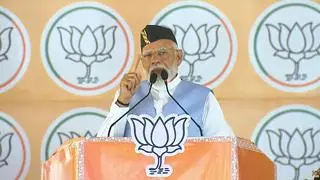Promising to re-set the country’s economic policy on the three ‘Ws’ — work, wealth, and welfare — Congress, in its manifesto released on Friday, introduced a strong dose of welfarism and offered fair competition to end “crony capitalism that defines the Modi government”.
The manifesto, termed “Nyay Patra,” talks of a targeted approach to uplift youth, women, and farmers of their socio-economic struggle, besides offering a “New Sankalp Economic Policy.” Congress President Mallikarjun Kharge, former party chiefs, Sonia Gandhi and her son Rahul Gandhi, former union minister P Chidambaram, and general secretary KC Venugopal released the 46-page manifesto at Akbar Road party headquarters on Friday.
The 2023 poll manifesto hinges on ‘Paanch Nyay’, that is five pillars of justice, comprising ‘Yuva Nyay’, ‘Naari Nyay’, ‘Kisaan Nyay’, ‘Shramik Nyay’, and ‘Hissedari Nyay’, party president Kharge said in his opening remarks.
Listing out the ‘Yuva Nyay’ programme, Congress guaranteed a new Right to Apprenticeship Act to provide ₹1 lakh a year for a graduate below 25 years of age, fill 30 lakh vacancies in sanctioned government posts, and write off student loans and interest accrued till March 15, 2024, as a one-time measure.
The lead opposition party also offered to provide free education till 12th standard and revisit the new education policy brought in by this NDA government. Congress also resolved to introduce a “Mahalakshmi scheme” to provide ₹1 lakh per year to every poor family as an unconditional cash transfer. Additionally, the party said it will reserve 50 per cent of central government jobs for women starting from 2025 and scrutinise all gender-discriminating laws.
Likewise, for farmers, the party has accepted their demand raised during the agitation to give a legal guarantee to the Minimum Support Prices (MSP) announced every year by the government.
Reaching out to the bottom of the population, the party guaranteed a national minimum wage of ₹400 per day introduce reforms in industrial and labour laws to restore balance between labour and capital.
Former Congress president Rahul Gandhi stated that the manifesto reflects what 98 per cent of the population wants and not 2 per cent of the monopolistic business regime of the likes of Adani that Prime Minister Narendra Modi reflects.
He said Modi has created a monopoly in political finance by using Enforcement Directorate (ED), Central Bureau of Investigation (CBI) and Income Tax just like the Adani Group did in sectors like port, infrastructure, and defence. The electoral bonds showed that political funding to the BJP was through “extortion” and putting “pressure” on the corporates, he alleged.
“First of all, we will need to understand what’s happening in the political structure today in India; what’s the foundation of the strategy made by the RSS, BJP and PM Modi. The way there is a monopoly of Adani on defence, ports, and infrastructure, similarly, PM Modi has formed a monopoly of political finance with the help of the ED, CBI, and Income Tax Department,” Rahul Gandhi said in response to question.
He warned that if Congress comes to power it will take action, because the electoral bonds document has all the details. “It is actually a chargesheet and Congress-led govt will use it, he said.
In the “wealth” segment of the New Sankalp Economic Policy, Congress, which has formed a broader coalition of opposition parties under INDIA umbrella, said it will double the GDP in the next ten years. A ₹100-lakh crore economy was inherited by the BJP government in 2013-14, but they wasted a golden opportunity. If Congress had continued in office, the economy would have doubled again, and stood at ₹200-lakh crore in 2023-24 but it will reach only ₹173 lakh crore by this fiscal year which ended on March 31, it stated.
The party also promised to bring the next set of reforms in the GST Act, free healthcare, and bridge historical inequities by conducting a nation-wide socio-economic and caste census for affirmative action. The party also vowed to look for a constitutional amendment to lift the 50 per cent cap on reservations for SC, ST, and OBC communities.






